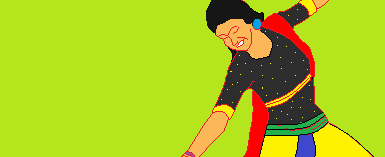Spadina Literary Review — edition 37 page 08
fiction

The Wedding Dancer
by Habib Mohana
Dancing was statuesque Farzana’s fierce passion. No marriage party in her neighbourhood in the city of Dera was a pleasurable event without her presence. At home, whenever she felt lonely and bored she would bolt her bedroom door on the inside, push her best-loved cassette into the machine and do a lively dance.
At about age 51, her hair started to grey and her passion for dancing died down. Raising and educating three boisterous kids had sapped her energy. After her husband’s death she shunned the wedding parties and if she ever attended them she refused to participate in any dancing. She got a vicarious thrill from simply watching the younger women dance and twirl.
Farzana’s two daughters were married and had their own children. Her only son Murad after earning a pharmacy diploma landed a lucrative job in Islamabad. He often called his mother and told her about a female colleague he ardently loved. He sent his mother a photo of his girlfriend. She gazed at it adoringly and kissed it multiple times.
One evening Farzana went to a marriage party in the neighbourhood where two female drummers banged the drums and sang a folk song. Some women and girls danced while others enthusiastically clapped their hands. One of her friends, putting an arm around Farzana’s waist, gently shoved her towards the dancers, but Farzana shied away.
Then the bridegroom’s mother dragged Farzana into the dance area and the drummers, familiar with Farzana’s old love for dancing, struck up a lively rhythm.
Farzana’s dance steps were awkward but soon her old grace and balance resurfaced and she was dancing like a butterfly. Kicking off her shoes and pitching her head shawl to a friend, Farzana released her long luxuriant hair from the hair-catcher and it fell in a rippling cascade to her hips. She shut her huge hazel eyes and, to the pounding of the drums, she danced round and round, her hair blowing up and forming a twirling umbrella over her. All other activities came to a standstill as everyone watched her. The onlookers formed a circle around her, clapping, singing and whooping.
Farzana lived in a sprawling house with her brother-in-law’s family. Javed, the brother-in-law, received a call on the landline that Murad was run over and killed by a whizzing automobile in Islamabad while he was going out to dine with friends. Murad’s friends had loaded the dead body into an ambulance and it was due to reach Dera in the morning.
Mounting his bike, Javed rode off to convey the bitter news to all their relatives whose houses lay scattered across the city, while his wife, Yasmin, went to impart the tragic news to Farzana.
The wedding party was in full swing and the wedding house shook with the ear-splitting drumming. As Yasmin entered, Farzana was doing a Jhomar ecstacy dance while the onlookers clapped to the rhythm of the drums. Her loose thick hair floated around her like a cloud. The deafening music and jubilant shouts robbed Yasmin of her thinking power and she stood disoriented and helpless. She opened her mouth to call out to the dancer but her voice failed her. Then she rushed up to her sister-in-law, clutched her by the arm, and bade her come home.
“You go, I’ll be home shortly,” Farzana replied without ceasing to dance, her face sweaty and glowing, her voice hoarse with singing and shouting.
“It’s important! Let’s go, it’s late,” Yasmin screamed over the noise.
“Honey, let me dance for a while,” the dancer said.
Yasmin tugged angrily at Farzana's arm. “Farzana, you’re not in your right senses. Come with me now.”
“Let her be! Yasmin, dear, if you feel sleepy then you go home and sleep,” the bridegroom’s mother interjected.